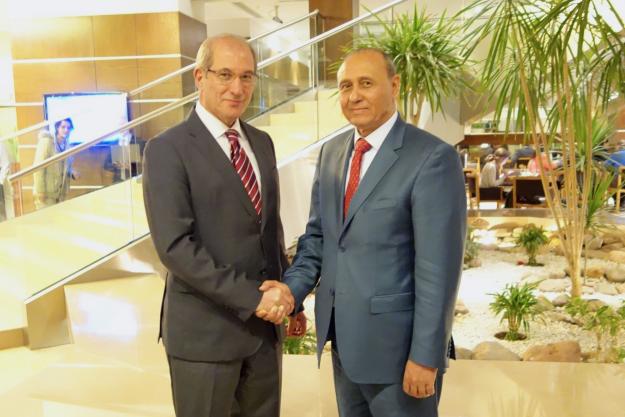
Director-General Ahmet Üzümcü (Left) meeting with the Libyan Foreign Minister, Mr Mohamed Abdulaziz.
TRIPOLI – At a joint press conference in the Libyan capital today, Libya’s Foreign Minister, Mr Mohamed Abdulaziz, announced that as of 26 January 2014 Libya has destroyed the remaining mustard gas filled in artillery projectiles and aerial bombs. Libya had previously completed last year the disposal of bulk mustard.
The announcement followed a visit to the site in south-eastern Libya where the destruction operations took place by OPCW Director-General Ahmet Üzümcü and representatives of Germany and the United States, whose governments provided Libya aid to eliminate its stockpile.
“The destruction of these munitions was a major undertaking in arduous, technically challenging circumstances, as we saw first-hand earlier today at the remote Ruwagha Chemical Weapon Destruction Facility,” the Director-General said. “From start to finish, meeting these challenges was the product of close cooperation between Libya, the OPCW Technical Secretariat and other States Parties.”
Related: Interview with the Director-General on Libya
States Parties to the Chemical Weapons Convention (CWC) are obligated to declare and destroy all chemical weapons and related materials they may possess, under the verification of the OPCW.
On joining the CWC in January 2004, Libya declared to the OPCW possession of nearly 25 metric tonnes of bulk sulfur mustard agent; several thousand unloaded aerial munitions designed for use with chemical warfare agents; and several chemical weapons production facilities. The declared aerial munitions were immediately destroyed in March 2004, and in the ensuing years the production facilities were either destroyed or converted to peaceful purposes under the OPCW’s approval and verification.
Operations to destroy the bulk sulfur mustard agent began in October 2010 but were suspended in February 2011 when the destruction facility malfunctioned. Following the conclusion of Libya’s civil conflict, the new Government declared a newly discovered amount of munitions loaded with sulfur mustard that had not been acknowledged in Libya’s original declaration.
Germany, Canada and the United States provided assistance to the new government to resume destruction operations at Ruwagha in early 2013. Preparations for the destruction of chemical precursors, which are Category 2 chemicals, are planned to start later and their destruction is to be completed by December 2016.
At today’s press conference, the Libyan Foreign Minister and OPCW Director-General were joined by the U.S. Assistant Secretary of Defense for Nuclear, Chemical and Biological Defense Programs, the Honorable Andrew C. Weber; the U.S. Ambassador to Libya, H.E. Deborah Jones; the German Ambassador to the OPCW, H.E. Eberhard Schanze; and Canada’s Chargé d’affaires in Tripoli, Mr Denis Thibault.
For more details on Libya, see Libya: Facts and Figures
